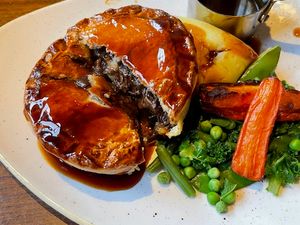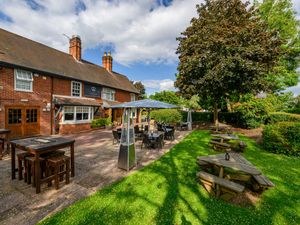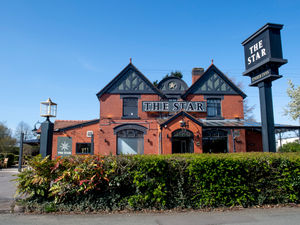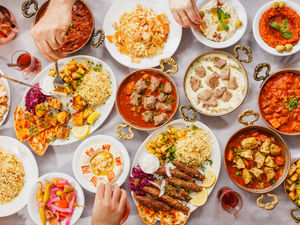Chef Liam Dillon breaking ground at the Boat Inn in Lichfield
We ought to be talking about Michelin stars and household name chefs.
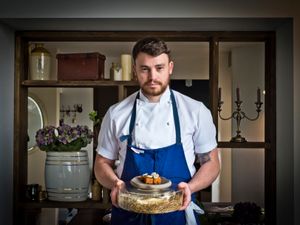
We should be talking about Liam Dillon’s recent trip to Jersey, where he cooked with the former one-star cook, Will Holland, with whom he worked at La Becasse, in Ludlow.
We ought to at least be talking about the growing spring larder, as Liam considers which local suppliers will provide abundant, peak-condition for the Michelin-rated kitchen, at The Boat Inn, in Lichfield.
But we’re not. We’re talking Tarmac. Or, more specifically, we’re talking car parks. Buckle up. It’s going to be a bumpy ride.
Liam Dillon is the exceptional and fast-rising chef-patron of The Boat Inn, one of only four West Midlands pubs that feature in Estrella Damm’s list of the UK’s Top 100. He’s in good company – the only two above him are within touching distance and are Adam Bennett’s brilliant The Cross, at Kenilworth, and Richard Craven’s inventive and imaginative The Royal Oak, at Whatcote, in the Warwickshire countryside.
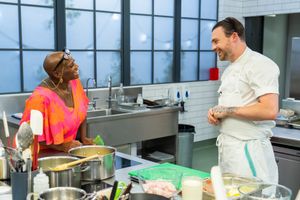
So why the blazes is he banging on about car parks, when there’s a formidable gastronomic pedigree that we could be talking about?
“You see that, out there,” he says, pointing to an empty car park. “Beneath that, we’ve got our own water treatment plant – it’s the size of two double-decker buses.”
A water treatment plant?
“Yes.”
It turns out The Boat Inn is one of the most environmentally conscious restaurants in the UK. We’ve all heard about chefs with their own gardens, chickens, small-holdings and similar. But a water treatment plant that recycles waste water – not just waste food – which then irrigates the crops being grown for the kitchen is taking things to the next level.
“We’re not on the mains water. We have a water treatment plant under the car park. Early on, when we bought the business, we dug out the grease trap outside the kitchen, then I put a grease separator underneath the sink, which collects grease there. Every six months we get that removed.
“We’ve put a lot of money into the water treatment plant and that now pumps out grey water onto the land behind. That grey water can be used to fill a canal or feed the land. There’s a green light on a lamp post, on the car park, which shows us that clean, aerated water is being pumped onto the land.”
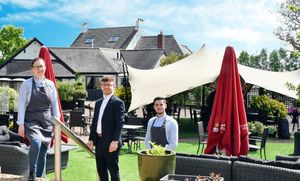
It kind of goes without saying that all of The Boat Inn’s food waste is recycled, too.
“Everything, the trimmings, the carrot tops, is minced down every day. That’s fed to the chickens or its fed into the compost.
“The aquaponic system that we’re building at the moment is going to help us grow fish.”
Wait. Wait a minute. Grow fish? In land-locked Lichfield, a city that’s literally the furthest from the sea in the UK, at 84 miles, and which has a plaque in the town commemorating the fact and the distance of 84 miles? It turns out Dillon and his team are planning precisely that. Trout will be grown in giant pools, fed by the water treatment plant, so that Dillon can conjure jazzy dishes at the start of a dinner.
“The only thing that we’re going to look at now is having the food waste that comes off plates to feed a pig. That means literally everything from the restaurant is being recycled. We’re using the grey water to feed the land, we’re using the uncooked food waste to feed the chickens, then we’ll use the cooked food waste to feed a pig. We’ll even use the fish waste to feed the land, which promotes better soil quality and encourages the worms to come through.”
The pig, Dillon adds, won’t end up on the menu. “Because it’s going to be eating food waste – but not pork, I should add – we won’t be able to kill it and use it in the restaurant, although I’ll be able to eat it.”
Which is the least he deserves, given the amount that Dillon’s doing to turn The Boat Inn into an exemplar of good environmental practice. Oink, oink. Tuck in.
“The pig will basically be our waste disposal unit.
“We had no idea what we were creating. But basically, everything is either used or reused.
“We’ve got two big fish tanks and we’ll be growing trout in those. The water’s all filtered. The solids from the fish tank goes on the ground. It’s all connected. We’re still building now. We can harvest the fish to use in the restaurant. I don’t know any other restaurant that has aquaponic systems or has water treatment plants.
“I’ve got my own bee hives. I’ve got four in at the moment and another five coming. I like to keep bees. We’ve got a load of planting beds. So the bees will fly over the land and pollinate everything we’re growing. We’ve got two-and-a-half acres and we’re making it entirely self-sustaining.”
Wow. Just wow.
And while there’s much to admire about Dillon’s environmental credentials, the environmental developments are aimed equally at providing him with exceptional, organic produce that helps him showcase the best of the local terroir. On Dillon’s hands and wrists, there are tattoos of honeycomb and wild mushrooms.
He’s clearly a man who walks the walk, as well as talking the talking. Putting his money where his mouth is and investing heavily in the greenest kitchen in the UK means he’ll have a steady supply of produce that he’s cultivated himself, while not creating any sort of carbon footprint.
The Boat Inn is championing the environment, while also turning out exquisite, three-AA-rosette food, as Dillon aims to join the ranks of Michelin-starred kitchens, similar to those in which he formerly worked.
“There’s still a long way to go,” says the chef, whose impressive resume includes stints on Great British Menu, and who cooked with Will Holland at La Becasse, in Ludlow, and worked with Marcus Wareing, at The Berkeley; before going onto cook in kitchens around the world, from Tom Sellers' Five Fields and Story, in London, to Quay, in Sydney, Noma, in Copenhagen, and Eleven Madison Park, in New York.
Since then, he’s been named the region’s Best Chef at the Midlands Food Drink & Hospitality Awards as he’s completed the remarkable transformation of The Boat Inn, while also helping to make Lichfield a bona fide foodie destination.
Not that he’s finished his masterwork. There’s more planting, growing and developing to do – and Dillon hasn’t ruled out further premises, should he find the time and investment to grow.
He’s gunning to improve, to gain more accolades, to do things better, though that’s a path that he’s been on since he began. Food has a sentimental value for him, having learned to cook with his great inspiration, Dorothy, his nan, when she was alive.
“The Boat Inn is unrecognisable from when we bought it,” he says. “But to be honest, we’re just getting started. There’s so much more that we want to do.”
The future is bright. Watch this space.


